Chef 187 released the video for his song “Ndafilwa Ukuichindika”
Directed by Ikonik Media Powerhouse Make up by Brand Nu Artz
BY KAPA187
As Zambia prepare to face Cape Verde under very harsh circumstances this evening, it should not be time for whoever is responsible for this delayed departure fiasco to go scot free.
Officials engaged to plan, plot and organise the charter flight should not be let off the hook even before the match has kicked off.
The dust should not be left for them to settle over this disaster and the incompetent culprit(s) should not be allowed to watch the game on their cosy sofas or bar and brag about inglorious part in this act.
It must be dealt with swiftly now while the iron is still hot.
It is almost treasonable for someone to even think that is an acceptable operational hiccup.
It is a straight forward case that does not require us to endure another a mineral water table-filled commission of inquiry.
Money was released in time we are told for a plane to be sourced but what was the guy or guys ordered to find the aircraft doing all of last week?
Sad to say but Zambia has endured endless travel conundrums over the years, one fatal and families are still baying for the fall guy.
Since then, one can only be reminded of the Motel 6 scandal in Florida in 1999 after an away friendly against Honduras and in November 2008 the team had a transit nightmare in Amsterdam after facing Morocco in a friendly away in Rabat.
A year later, there was a UK visa scandal for the Ghana friendly in London and then in September, 2013 we had the 2014 FIFA World Cup trip to Kumasi that was delayed for 48 hours and saw the team fly to Ghana on the eve of the game from their Johannesburg training base.
A month later, there was an ill-handled club versus country standoff with TP Mazembe over the release of Rainford Kalaba, Stopilla Sunzu and Nathan Sinkala for the Brazil friendly.
It is finally time to make an example of someone or some people because everyone is very tired of the litany of logistical failures.
If no justice is dispensed over this latest fiasco then we truly do not value our 2012 champions and taking them for a big ride.
Zambia face a serious test of character today when they face Cape Verde away in a 2015 Africa Cup Group F qualifier.
It has been a forgettable last five days for Zambia and coach Honour Janza.
Firstly the team was unconvincing in their Group F opener against Mozambique who held them to a 0-0 home draw in Ndola.
Then on Monday and Tuesday they were the victims of what is turning out to be a perennial bout of administrative and logistical bureaucracy that has characterised their long haul away matches over the last six years.
Zambia left for Cape Verde at the eleventh hour on Tuesday night and will virtually disembark from the plane and head straight to the stadium .
The match will be broadcast live on SuperSport 9 at 19h00.
Zambia have one point, two behind Cape Verde who they will be meeting for the first time ever.
Cape Verde have began the campaign on a flying start with a 3-1 away win over Niger last Saturday to hand new coach and ex-Portugal striker Luis Aguas a bright start in his first national team coaching appointment.
Aguas has clearly stated that beating Zambia could signal the turning point so early in the Group F qualifiers on the road to Morocco.
“The game [against Zambia] has greater importance [than the Niger game] if we can also repeat what we did in the first match then we can consolidate our position in the second game,” Aguas said.
Meanwhile, a win for Zambia will be a great boost for underfire Janza after that poor draw on his competitive debut.
But most importantly a win should not be hijacked by the usual suspect officials and should be solely dedicated to the players who have endured nothing but a very rough ride to Praia for this evenings game.

Evangelical Fellowship of Zambia (EFZ) Executive Director Pukuta Mwanza has warned that tribal talk is recipe for anarchy, lawlessness and civil wars and should be discouraged.
Reverend Mwanza says it is for this reason that talk of tribalism surrounding the ruling Patriotic Front should be discouraged.
Rev Mwanza has told Qfm News in interview that anything that has to do with tribal talk should be handled cautiously because of its devastating consequences.
He says those peddling tribal talk should be very careful or risk plunging the country into very serious problems.
Reverend Mwanza says those aggrieved over perceived tribalism should seek better avenues of having their grievances sorted out.
He states that Zambia has been a united country across tribes under the One Zambia One Nation motto coined by the country’s first republican President Dr Kenneth Kaunda.
Reverend Mwanza says it is important that the unity that has been there since independence is upheld.
Rev. Mwanza further states that Zambians should always strive to unite and work in love and harmony regardless of one’s tribe or political affiliation.
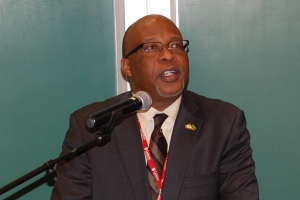
MMD President Dr Nevers Mumba says former PF Secretary General Wynter Kabimba should take the blame for the costly and unprecedented by election the country is undertaking.
Dr Mumba accused Mr Kabimba of scheming to deplete the opposition seats in Parliament.
He said he was happy that Mr Kabimba had been dismissed saying this has put a stop to his ill intentions.
He was speaking in Mkushi South constituency where he addressed a meeting to drum up support for MMD candidate Sydney Chisanga in Thursday’s by election.
“Mr Kabimba wanted to kill the opposition in Parliament, I am grateful that his ill intentions have been killed since he was sacked by President Sata,” Dr Mumba said.
Dr Mumba said the MMD has fought hard to preserve the country’s democracy which he said was under threat with Mr Kabimba at the helm of the PF.
Zambia has held over 20 by elections since 2011, majority of them occasioned by court nullifications of election results.
POLICE in Kabwe have arrested a blind couple for allegedly stealing K15,000 meant for the Blind Skills Farmers’ Club in Serenje.
The police identified the couple as Isaiah Mushota, aged 56, and his wife Doreen Mando, 44, both of Katondo Township in Kabwe.
Central Province Commissioner of Police Standwell Lungu said that the Blind Skills Farmers’ Club was run by the visually impaired and supported by the Ministry of Community Development and Social Welfare.
The two were leaders in the farmers’ club at the time they allegedly stole the money before fleeing from Serenje.
Mr Lungu said police investigations revealed that the money (K15,000) was deposited in June this year through Finance Bank in Serenje into the club’s account but it was later withdrawn by Mushota from Lusaka.
The couple is suspected to have taken advantage of their positions in the club, where Mushota was chairperson and his wife treasurer, to access the funds illegally.
Mr Lungu said the couple had been on the run for a while but was finally apprehend yesterday in Katondo area and would be charged with theft.
In another incident, police are investigating a case in which a 22-year-old Kasama-based MTN agent was attacked by three men and a woman armed with knives, who got away with an undisclosed amount of money and K14,000 worth of scratch cards in Kabwe.
The incident happened at Mukobeko Market after the victim, identified as Friday Mulenga, was forced into an unregistered Toyota Camry while standing by the road side.
The vehicle drove off along Mukobeko and Mpunde roads, as his attackers searched and later dumped him after relieving him of money and talk time.
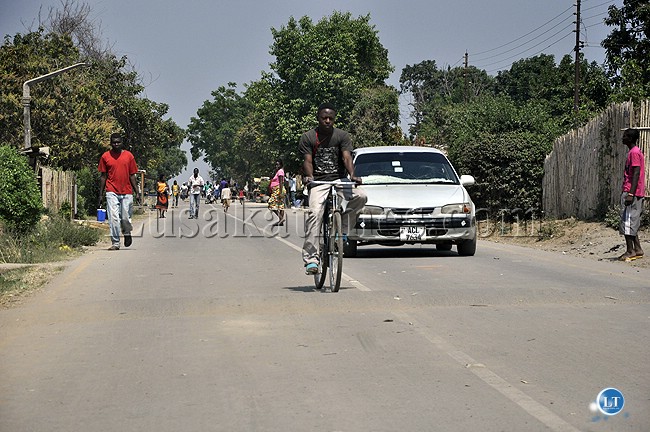
Fifteen people in Luanshya have been struck by lightening following unexpected heavy rains that have also left a trail of destruction.
ZANIS reports that the 15 include 12 pupils and three teachers at the school who have sustained injuries.
One of the injured, Evans Siakwale a science teacher at the school explained that the pupils sustained minor burns, cuts from the shattering window panes and skin irritations and were hospitalised at Roan Antelope General hospital and have since been discharged.
Mr Siakwale told a ZANIS reporter who visited the school that the incident happened around 13:00 hours today when lightening struck the security lighting tower passing through the buried electricity cables, blowing off circuit breakers in the classroom and the home economics department.
He narrated that the lightening also blew off part of the class wall and roof which descended on him, filling the class with dust and smoke emanating from the burning cables and sockets in the classroom.
The teacher explained that panic gripped the class but that he was able to calm the pupils as he opened the door and asked them to walk out calmly.
He also said the home economics department caught fire which was quenched using extinguishers adding that two classrooms have had their windows shattered, electricity wiring burnt down and the borehole has also been affected.
Mr Siakwale feared that the affected water supply posed a challenge on the school’s adequate preparation for the end of year examinations for grades twelve and nine.
And Luashya district Commissioner Harold Mbaulu described the incident as unfortunate.
Luanshya yestrday experienced unexpected heavy rains which caught a lot of people unawares.
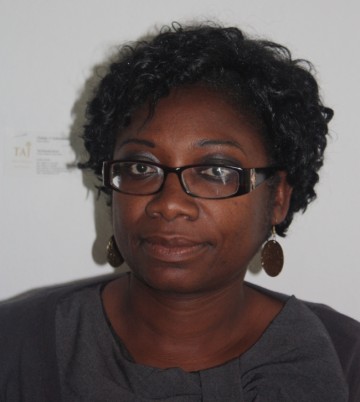
Lusaka City Council (LCC) has warned parents and guardians that they risked being prosecuted if they allow their under-age children to patronize bars and night clubs.
The local authority says it was seriously contemplating on enacting a by-law that would ensure that parents and guardians found wanting are prosecuted together with the bar owners.
Speaking in an Interview with ZANIS in Lusaka yesterday, LCC Assistant Public Relations Manager, Brenda Katongola urged parents and guardians to ensure that children under the age of 18 do not patronize taverns, bars and night clubs as it was an offence.
Ms. Katongola disclosed that over the weekend, the Council conducted an operation in Chilenje, Kabwata and Woodlands in which 30 under age patrons were arrested for being found in pubs.
She disclosed that 22 under age patrons were picked from Lazy Men’s bar, Chris Corner bar in Chilenje Township and at KCC bar in Kabwata Township while eight were picked from Border View bar.
She said the suspects were first taken to Woodlands Police Station before being detained at Simon Mwansa Kapwepwe prison.
She said all the 30 under-age patrons have since been released upon paying K22 .50 admission of guilt fines while the bar owners would soon be prosecuted in the Fast-track court system.
Ms. Katongola further cautioned other bar and night club owners against allowing under age patrons in their premises or risk being arrested for breaking the law.
She said the operation was on-going in the townships and compounds in the city.
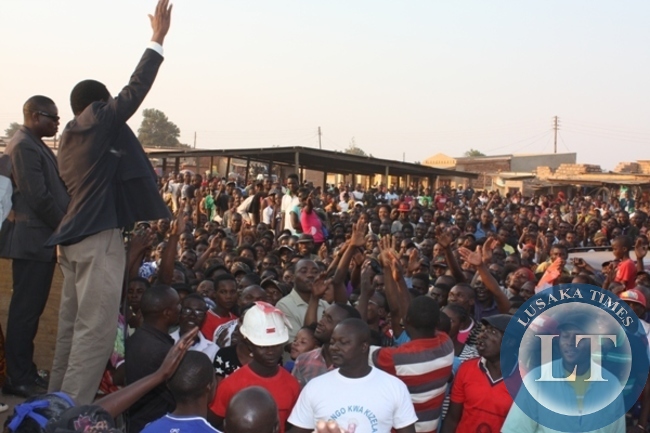
FOR IMMEDIATE RELEASE
9th September 2014
Fellow Zambians, on the 11th September 2014, we are going for another round of bye elections. This time we are going into Vubwi, Mkushi South, Kasenengwa, Zambezi West and Solwezi Central. As I write this, I have just left Zambezi west bank and I should say that I am happy with the preparations for the elections in all the five constituencies.
Let me first thank the people in these constituencies. Firstly for receiving UPND with open hands and lending us their ears to give them our message. Secondly for looking after the campaign teams in their localities. Thirdly for conducting themselves in a peaceful manner. Zambians are peace loving and this set of by-elections has shown that Zambians can rise above pettiness and discuss issues that affect them. I say thank you people of Zambezi, Solwezi, Vubwi, Mkushi and Kasenengwa.
Let me also commend the Electoral Commission of Zambia (ECZ), who while working under difficult conditions has conducted, possibly the highest number of by-elections from the time they were created. ECZ does not have the adequate legal cover but they are trying their best. ECZ is working with political parties that are abrogating the code of conduct with impunity because they are in a privileged position, but the ECZ have tried their best to manage these malpractices.
Let me also thank the Zambia Police for maintaining peace and order from the day the campaigns started. Police have received nothing but condemnation but they have not lost sight of their mandate, that of maintaining peace and order.
Let me take this opportunity to also thank the campaign teams in the five constituencies who had to endure grueling conditions just to ensure that the UPND message reached far and wide. I am greatly indebted to you all no matter the result. I know that you have done your best to ensure that we are victorious.
Lastly I appeal to the people of Kasenengwa, Vubwi, Mkushi South, Solwezi Central and Zambezi West to turn out in numbers, on Thursday 11th September and exercise their right to vote. I urge you, wonderful people of these constituencies, to vote wisely. Vote in a manner that we will put our country on a steady path to restoration and repair.
I thank you.
Hakainde Hichilema
UPND President
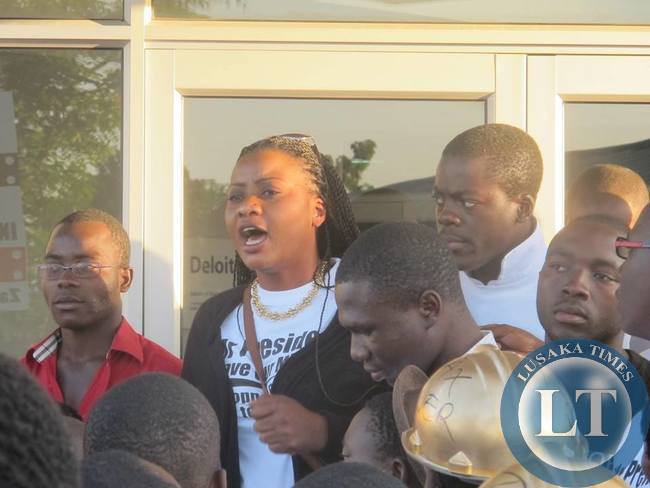
Action Aid Executive Director Pamela Chisanga has observed the need for adequate and qualified personnel if the Zambia Revenue Authority is to execute its mandate professionally and to the satisfaction of the Zambian people.
Speaking in an interview Ms. Chisanga said questions will continue being asked as to whether the Authority has the capacity to collect the right taxes on behalf of the Zambian people as well as effectively handle the country’s tax administration effectively as long as cases such as the refund claims by the mining companies continue to arise.
Ms. Chisanga noted that building the capacity at ZRA will not only enhance the operations of the Authority but will lead to effective collection of taxes as well as an increase in the money that government will be receiving from companies from taxes.
“Obviously the capacity of ZRA is very questionable in terms of collecting taxes or handling tax administration because when you look at the issue of tax refunds as an example; the companies used to claim their refunds on the basis of the documentation that they provided in the past. ZRA obviously accepted that because of the documentation which were provided in the past but now they have realized that have not been doing the right thing as provided in the guidelines and suddenly they want to be implementing them.
When you look at those examples clearly in terms of capacity we have a lot of issues at ZRA and this needs to be addressed.
She added: “this needs to be done very quickly because for a long time now we have been told that government is doing every possible to support ZRA build their capacity but we are not seeing any progress in terms of the capacity that is being felt in ZRA to effectively collect taxes.”
Council of Churches in Zambia General Secretary Rev Susan Matala has called on women across the country to aspire for more decision making position and fully participate in the nation’s developmental agenda.
Rev Matala said there is need for women in the country to stop feeling inferior to men because men and women are equal and can do anything that men are able to do hence the need for women to take part in the developmental agenda of the country as leaders and not just bystanders.
She noted that there has been perceived notions that men are superior to women which has been driving the agenda world over hence the need to change the mind set of not only women but men as well because they are perpetrators of the prejudices that women inferior to men.
She urged women to raise up and challenge men for leadership positions in all spheres of life as there are in a better position to make informed decisions as there are the people who mostly understand the cost of bad decisions.
And Rev Matala has observed that it is possible to have a woman president in the country.
She said there is no reason why the country can not have a woman president when other countries such as the neighbouring Malawi have had women presidents.
Rev Matala further observed the need to break down the barriers limiting women’s participation in national agendas so as to make them feel confident as full human beings to do what ever a man can do.
“The only reason why we have not had a woman president up to now are the prejudices of how we have perceived the position of women in society; so this self preservation and perpetuation of women being inferior to men is what drives the agenda.
“The barrier that makes women feel inferior to men can be broken we just need to think through how these barriers can be broken so that we as women can feel confident as full human beings and not half so that we can do whatever men can do.” Rev Matala.
She added: ” we have seen many women become presidents of their nations now the number is increasing and I don’t see why Zambia should not have one.”
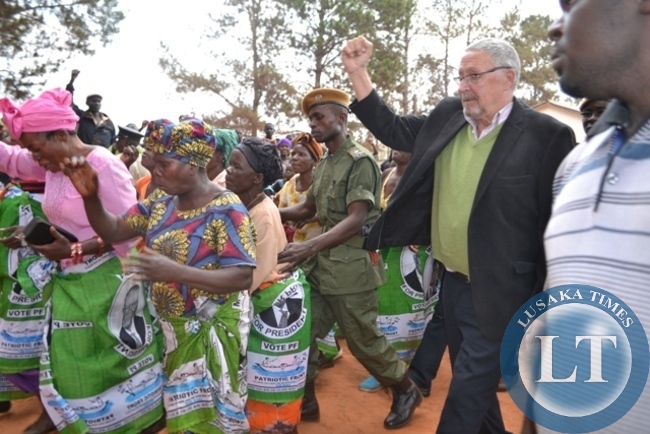
President Michael Sata is expected in Solwezi today to campaign for PF candidate Newton Malwa.
Vice president Guy Scott has announced at the last public rally he held in Solwezi on yesterday.
Dr Scot who was in the constituency, also met Chief Kapijimpanga and urged the people of SOLWEZI to turn up in large numbers to listen to President SATA’s message.
Dr. Scott says the President loves the people of Solwezi and North Western Province, and should therefore support the PF for development.
And Dr Scott says it is important that the PF scoops the Solwezi Central seat in this Thursday’s Parliamentary by elections.
He says this is because Northwestern Province is thirsty to benefit from development taking place under the PF Government.
Dr Scot was speaking when people welcomed him at Solwezi Airport on his arrival in the morning.
And PF Campaign Manager for the area Gabriel Namulambe is happy that campaigns have been peaceful and has thanked police for ensuring that no cadres were imported into Solwezi.
And at a rally in Chief Kapijimpanga’s area, PF National Youth Chairman Chishimba Kambwili said time has come for the people of Solwezi to vote for young people into high decision making positions
And Kabwata Member of Parliament Given Lubinda says the people of Solwezi should now try PF because the opposition has allegdely.
And Sports Minister CHISHIMBA KAMBWILI says former PF Secretary General and Justice Minister WYNTER KABIMBA has NO room in the ruling party, and that the Post Newspaper should STOP referring to the PF as tribal clique.
Mr. KAMBWILI says the Post Newspaper should actually blame Mr Kabimba for frustrating other members like Kabwata MP Given Lubinda and his Mufumbwe counterpart Stephen Masumba.
However, Mr Kabimba has not commented on Mr Kambwili’s statement, that the former Party Secretary General is no longer wanted in the PF.
ZNBC made several attempts to reach Mr Kabimba by telephone but failed.
Mr Kambwili made his comments when he addressed a public rally to drum up support for Solwezi Central PF Candidate NEWTON MALWA.
And Mr. LUBINDA urged Solwezi electorates to vote for PF Candidate Mr. MALWA because the opposition has allegdely failed the people of Solwezi.
Meanwhile MUFUMBWE Member of Parliament STEVEN MASUMBA says his District has recorded progress because of working with the Government of the day, while Mines Deputy Minister RICHARD MUSUKWA says only PF Government will develop Solwezi.
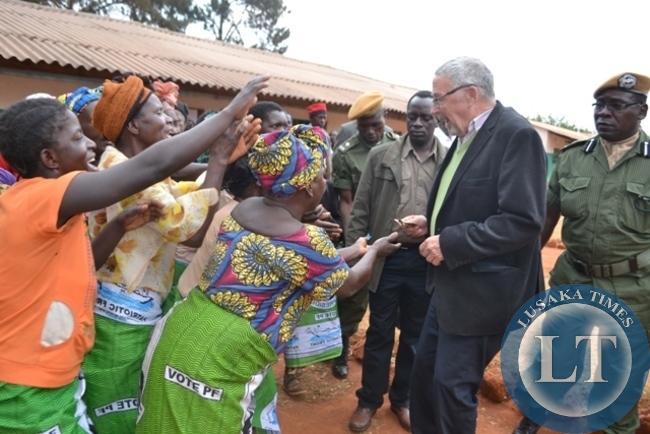
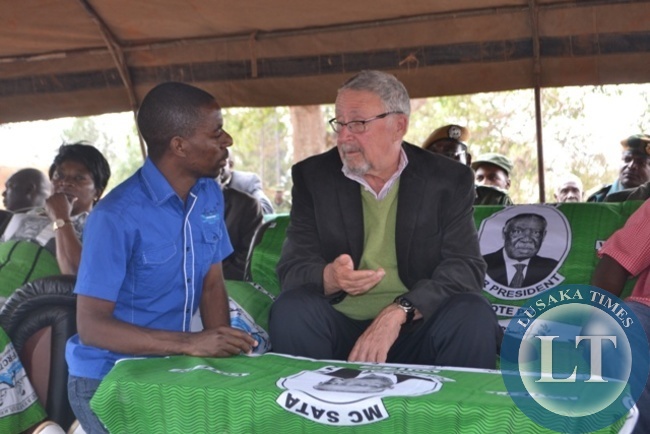
Zambia captain Christopher Katongo says Chipolopolo’s morale has not been hit by the two day departure fiasco for the Cape Verde game.
Zambia have been marooned in Ndola for the last 48 hours after their chartered flight departure for Wednesday’s 2015 Africa Cup qualifying match was first cancelled at 06h00 on Monday and at the same time on Tuesday.
The team finally took off just before 22h00 from Ndola to Praia via Dakar.
“What we need is the support from the fans,” Katongo said.
“It has not been affected by anything. All the players are looking forward to put in the best and recover the points that they dropped against Mozambique.
“What we need is the support from the fans.
“We need the fans just as they need us to perform.It is a reciprical thing and we are not going to disappoint them. wWe are going to deliver with their support.”
It has been a rough last five days for Zambia who first played out to an unconvincing 0-0 draw with Mozambique on Saturday in Ndola before they were hit by Monday and Tuesday’s ordeal.
Zambia’s 48 hour delayed departure to face Cape Verde has ended.
The ordeal ended after 20h10 on Tuesday night when an Airbus A320 chartered from South Africa touched down at Simon Mwansa Kapwepwe International Airport in Ndola.
Ten minutes after the plane landed, Zambia rolled into the airport looking relieved that their 48 hour ordeal was finally coming to an end.
Sports deputy minister Christopher Mulenga twice apologised to the players at the hotel and at the airport over the ordeal.
However, while the players accepted the apology, they reminded Mulenga that this was the second time the team had been let down over a chartered flight after last years fiasco ahead of their 2014 World Cup Group F qualifier against Ghana on September 5.
Meanwhile, Zambia are expected to literally go straight to the stadium on Wednesday evening to face Cape Verde following their last minute dash to Praia on a nine hour flight.
Zambia are two points behind Cape Verde on one and three points respectively heading into match day two of the 2015 Africa Cup Group F qualifiers.
Coach Beston Chambeshi says Nkana wants to win the 2014 Barclays Cup.
Nkana starts the Barclays Cup campaign with a 15h00 kickoff quarterfinal match against their Kitwe rivals Power Dynamos on Sunday at Nkoloma Stadium in Lusaka.
Chambeshi is relishing the first Kitwe derby in the Barclays Cup.
“It is a nice draw. We just need to prepare very well for this encounter against Power,” he said.
“We have been ready for the Barclays Cup since we qualified for the tournament.”
Nkana are yet to win the Barclays Cup which Power have scooped twice.
Chambeshi said:”Our aim is to win the cup that is why we are participating.”